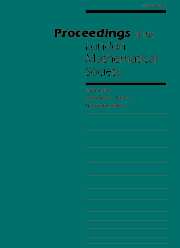A sequentially unconditional Banach space with few operators
Published online by Cambridge University Press: 19 October 2005
Abstract
A Banach space $X$ is said to be sequentially unconditional if every Schauder basic sequence has an unconditional subsequence. We provide an example of a reflexive Banach space $X_{isu}$ which is sequentially unconditional and such that every $T \in \mathcal{L}(X_{isu})$ is a strictly singular perturbation of a multiple of the identity. The space $X_{isu}$ belongs to the class of Banach spaces with saturated and conditional structure. Constructing $X_{isu}$ we follow the general scheme invented by W. T. Gowers and B. Maurey in their celebrated construction of a Hereditarily Indecomposable Banach space. The new ingredient concerns the definition of the special (conditional) functionals. For this we use a non-injective coding function $\sigma$ in conjunction with a Baire-like property of a sequence of countable trees stated and proved in the present paper. It is worth mentioning that $X_{isu}$ admits a richer unconditional structure than classical spaces like $L^1(0,1)$ and it remains unsettled whether $X_{isu}$ is a subspace of a Banach space with an unconditional basis.
Keywords
- Type
- Research Article
- Information
- Proceedings of the London Mathematical Society , Volume 91 , Issue 3 , November 2005 , pp. 789 - 818
- Copyright
- 2005 London Mathematical Society
Footnotes
- 4
- Cited by


